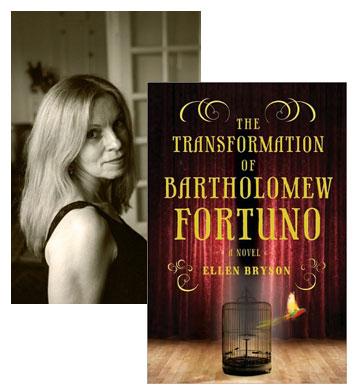Ellen Bryson’s Dream of Bearded Ladies

The Transformation of Bartholomew Fortunato is narrated by “the World’s Thinnest Man,” one of many “Curiosities” living and working in P.T. Barnum’s downtown Manhattan museum in the spring of 1865. Bartholomew has a very elevated sense of his calling, but his self-image has quite a few blind spots, which come into play when his own curiosity is aroused by the arrival of a bearded lady to the museum; his fascination with her coincides with Barnum’s own desire to keep tabs on his latest star attraction. Ellen Bryson says the idea for her debut novel came to her in a dream—followed by a bout of research that led her to photos of Barnum’s cast. But, she explains, the character that spoke to her in a dream was not the one whose voice would give the novel its shape…
The Transformation of Bartholomew Fortuno started with an image of six bearded sisters in a circus tent. I’d just finished Angela Carter’s amazing novel Nights at the Circus—there’s nothing better than a book about bawdy burlesque women—and drifted off to sleep. I woke up at 3:00 that morning to a vision of six fabulous sisters lined up in the shape of a half moon, their bearded faces lifted to the tent’s canvas ceiling. One after the other, they shouted out their names, a spotlight glimmering off their cheekbones and their luscious beards.
Today, I remember only two names: the first, Esmeralda, a spry young thing who still whispers to me for space on the page. The second was Iell. I can still see her calling out “Iell,” her beard a stunning, burnished red, her face the face of an angel. I couldn’t take my eyes off her. How could a woman with a beard be so beautiful? And so feminine? As the rest of the sisters dissolved into a sepia background, I couldn’t help but wonder if others would see her beauty or only see the beard? What would it have been like to be her? What was her story?
Iell will tell me, I thought. But, for the life of me, no matter how clearly I could see her, Iell would not speak.
So, hoping for inspiration, I hit the Internet looking for juicy tidbits about the circus and bearded women. There was Julia Pastrana, billed as the Monkey Girl at the turn of the twentieth century, and the Barnoness Sidonia de Barcsy, a member of the Hungarian aristocracy who gave birth to a dwarf, then promptly grew a full beard. Then I came across the saucy Annie Jones, who started out as the Bearded Girl, and the elegant Mme. Clofullia, the Bearded Lady of Geneva, both of whom worked for P. T. Barnum in the mid-nineteenth century. This was well before Barnum became the circus impresario I’d expected to find, and I was thrilled to discover that he was the world’s first advertising man and all but invented public hype. Best yet, his showplace was the American Museum in New York City, an audacious place full of curios and theatrical events, and destined to burn to the ground that very year. Perfect.
Pictures of the “freaks” from his museum gave me all I needed for characters: fat women, giants, midgets, albinos, anyone not of the norm. But it was a picture of one of his resident skinny men, Isaac Sprague, that really started things. Billed as the Living Skeleton, Sprague soon morphed into the character Bartholomew Fortuno, who, once he was renamed, proved to be so proud and distinctive that it became evident who my narrator would be. How interesting to find out that he loved his emaciated body and saw it as a gift to mankind. What better way to ensure these Prodigies would be seen as real people?
What I didn’t expect was that the novel would end up being Fortuno’s story, and that through him, more questions would arise. What was gift and what was providence? How are we made? How much can perception or our parents mold our sense of self?
Once I realized that Fortuno found Iell beautiful not despite her beard, but because of it, the story came alive. His world had its own hierarchy. Difference equated with value. What made one separate instilled worth. But beyond that, his life was the same as anyone’s life, buttressed by ego, flattened by illness, buffeted about by love and envy, just like the rest of us. Fortuno’s story is about bodies, to be sure. Strange, unique, uncommon bodies that were an art form for him. But heart still ruled, and the parameters of the larger society still applied. And truth, no matter who you are, is still truth.
28 June 2010 | guest authors |

 Our Endless and Proper Work is my new book with Belt Publishing about starting (and sticking to) a productive writing practice.
Our Endless and Proper Work is my new book with Belt Publishing about starting (and sticking to) a productive writing practice. 
